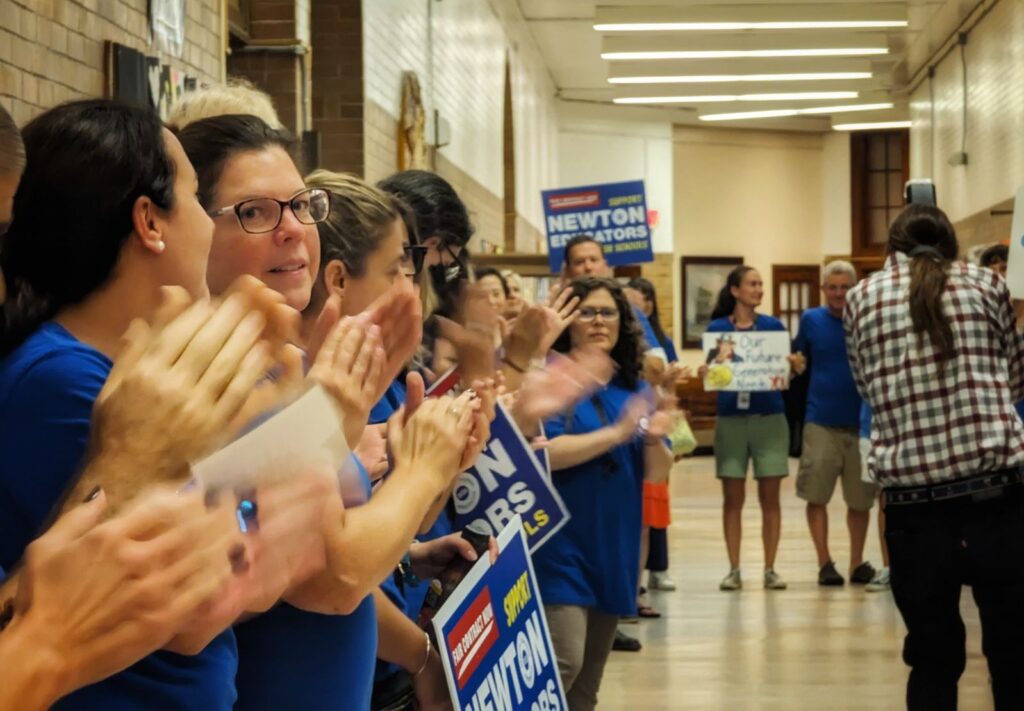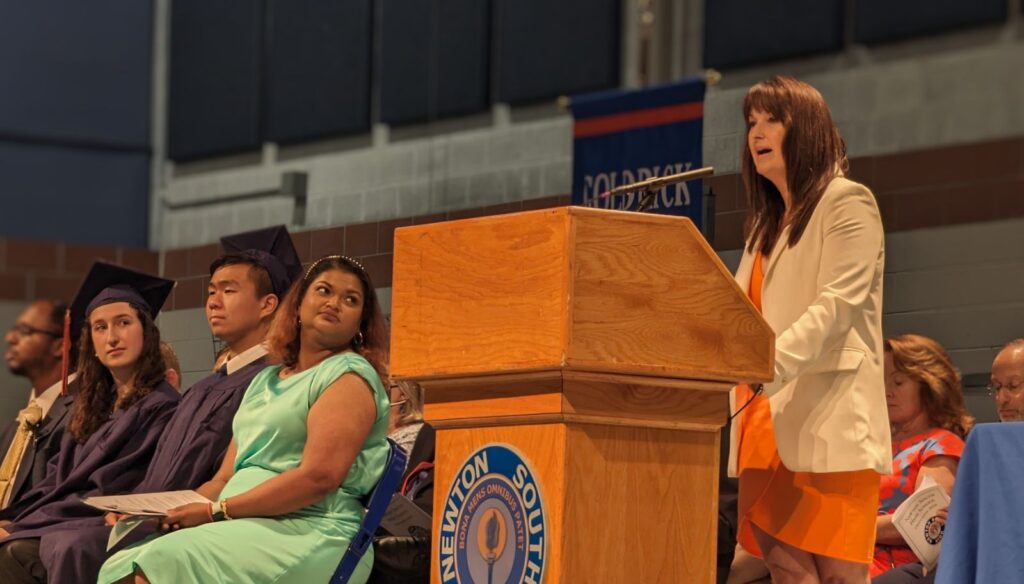Nolin
Newton's superintendent, Anna Nolin, reflects on her first year on the job, a job that has been marked by crisis and resolve. Photo by Bryan McGonigle
When Dr. Anna Nolin started her job as Newton’s superintendent of schools last summer, she knew she was in for a big year. Not only was she a new superintendent in a city of nearly 90,000 people, and the first woman to ever hold that position, she was also entering an arena of chaos.
There was a teacher contract dispute that ignited a two-week strike in January. The district had to cancel February break to make up missed days. A discussion about School Choice as a way to bring in money and fill classrooms had some parents in revolt. And this was all against the backdrop of declining public school enrollment, skyrocketing school operating costs and an aura of community mistrust toward local government and the school district.
“You know, certainly some of it was very surprising, but I’ve been doing this for 28 years—I guess I’m a tough old bird,” Nolin joked.
The former Natick superintendent and current president of the MetroWest Superintendents Association added that her dedication and passion for educating kids has kept her focused.
“So it’s pretty centering when you just remember what you’re here for, right?”
An open ear
One of the main themes Nolin saw among discussions with teachers and parents was the need to be heard. People don’t feel they’re being listened to when they voice concerns or ask questions.
“And I think that’s the worst feeling in an education community, that people don’t get me and don’t listen” she said. “So I feel good about the listening that we’ve done this year.”
To that end, Nolin recently announced a restructuring of the district’s leadership team with three new additions—Gina Flanagan as the new assistant superintendent of teaching and learning, Dr. Gene Roundtree as the new assistant superintendent of secondary education and Dr. Daniel Green as the new principal of Bigelow Middle School—who Nolin said will “breathe some new energy and new listening into what we’re doing.”
Trial by fire
Nolin didn’t get a chance to fully exercise her listening skills when she started, because the Newton Teachers Association and the School Committee were engaged in an ever-escalating contract dispute that doubled as a massive elephant in every room.
But Nolin came to Newton with a bold, comprehensive agenda to reshape Newton’s schools for the future and bring the district back to the envy of the region. And that drive had her ready to take on the unusually turbulent school year in which teachers went on strike, bias-related incidents spiked, and the community still grappled with the fallout from the COVID-19 pandemic.
In fact, Nolin said she’s “grateful” to have arrived in Newton when she did.
“I know that may sound odd, but I can’t imagine if someone came in now trying to encapsulate that for them,” she said. “How do you explain this year to anyone?”
‘We got a lot done’
There may be many words to describe the 2023-2024 academic year, and one of them would be “productive.”
Despite all the drama, the district was able to implement a big chunk of Nolin’s entry plan—a detailed agenda each superintendent presents to the School Committee when they start on the job—to address class sizes, community engagement, mental health and more.
“We got a lot done,” Nolin said with a smile and a sigh as she sat down at the conference table next to her desk.
For example, the district has identified what data to monitor for changes in student mental health and literacy, implemented the Sown to Grow program at all middle schools and set up a three-day social/emotional learning conference for staff.
The district also worked with school leaders and input from the NTA to redesign elementary school day schedules to make sure things like new literacy curricula can be scripted and implemented.
“I would say despite what is perceived as major conflict between union members and administration, I can assure you that while we don’t agree on everything, there is a unity around ensuring that the schools are the best that they can be,” Nolin said.
And a slew of other district initiatives in her plan were set into motion for the coming years.

Mending the wounds of COVID-19
In 2020, the COVID-19 pandemic threw the world into both chaos and standstill, shutting down society for the most part for months.
Newton schools were closed for longer than others—about a year and a half—and the backlash from Newton families was loud and impassioned.
So many parents pulled their kids out of Newton’s public schools that the pandemic was blamed for a sharp decline in student enrollment afterward.
Addressing a trust deficit has been a challenge for both the city’s government and its schools in the wake of the pandemic.
Part of that means enhancing and maintaining communication with teachers and families.
“There’s been a lot of calls for kids to get tested for special education in the city right now, because parents don’t trust that we’ll take care of [their kids’ needs] any other way,” Nolin noted.
So this past year, the district started creating a Parent and Caregiver Curriculum Page online, where teachers can share updates and documents, assessments (which will now happen three time a year per student) and program information with families.
“We’ll share it with parents, and when things aren’t going well, we’re going to respond, and when kids are doing well, we’re going to respond and let their parents know how well that’s going,” Nolin explained. “Every parent will know that three times a year their children will receive benchmark skill assessments in math and English language arts, and that information can be shared with parents at any time.”
Nolin compared the new system to having a regularly scheduled medical exam.
“If something doesn’t look right, we have to do something about it, and now we have the structure and the schedule to do it as well,” she said.
Less screen, more screening
The district has launched a pilot program for the 2024-2025 school year in which middle school students’ cell phones will be stored in pouches throughout school days so they aren’t using them, as part of a broader plan to address phone use among students.
And the district has set, for students in kindergarten through eighth grade, social/emotional screenings involving both teachers and students.
“The reason that we would do that is to see if there’s any difference in how teachers perceive kids versus kids perceiving kids,” Nolin said. “And what we found out were two major findings. One, the teachers think the kids are more emotionally regulated than the kids think they are. So the kids rated themselves lower in some areas, in how regulated they felt at school. So that’s a sign that like kids might be managing a lot of stuff, and they feel like the teachers aren’t necessarily seeing that. That’s important for us to know, so just as baseline classroom operations, that’s huge knowledge.”
The second finding the screenings have produced is that kids in Newton have a low “grit score”—a measurement of how they face and overcome challenges.
“I’ve just been using this screener in MetroWest for a long time, it’s lower than the region, and Massachusetts tends to be lower on this anyway,” Nolin said.
Nolin said she has some theories about that but didn’t go into detail. She did, however, say that she believes parents often get in the way of what she calls “productive struggle” (difficulty with obstacles that improve strength and skill) while trying to help.
“We don’t want children harmed in struggle, but there is some struggle that’s good, and there’s some struggle that has to happen independently of parents,” Nolin said. “And I think we all can agree, there’s a lot less freedom for kids and ability to do those struggles. What we saw was actual data on that, that both the kids and the teachers felt like the kids just don’t, you know, keep at it if they encounter a difficulty. So that’s something we’re going to have to work on.”

Feet planted, eyes forward
Nolin and the district will be able to work on that and more without a contract dispute in the coming year. And the district got all the money Nolin asked Mayor Ruthanne Fuller for in the Fiscal Year 2025 budget.
But speaking of budgets, schools are getting so expensive to operate that Fuller has already said the city will need another tax levy override to keep the schools on track in a few years.
Nolin oversaw a lengthy discussion about School Choice—a state program that allows families to enroll their kids in school districts outside their community, with the receiving district getting $5,000 per student per school year (with special education increments added).
The School Committee must vote every year on whether or not to join School Choice—Newton has never opted in—but because Nolin included School Choice as a means of increasing the district’s funds and addressing gaps in local enrollment, the discussion was more involved.
The district held several forums and informational meetings as well as a public hearing to answer concerns, but the idea received a barrage of backlash from people saying the district hadn’t done enough outreach about School Choice. And the School Committee eventually voted not to join the program.
“I think the issue, another post pandemic issue, is, what can people pay attention to,” Nolin said. “School choice means a lot of different things to different people, right? To some people, it’s a threat to the Newton community. To some people, it’s a way to stabilize the budget. To some people, it’s, you know, an interesting way to create diversity. I mean, you name it, there’s, there’s many, many ways to look at it.”
And since the School Committee has to vote on it again next year, Nolin said the discussion about School Choice will continue because it’s her job to present all available options for the district’s problems.
“I know people sort of reacted it to, like, ‘She just wants it for money,’” Nolin continued. “But let’s take the Ward School, for example, the Ward School in our enrollment projections, you know, it’s been down, down, down,” she continued. “So in two grades now, kindergarten and second grade, next year, there’s only one section of kids per grade level. So that’s hard, and it’s hard when you’re the lone teacher in that way.”
If more families move into the city with school-aged kids, School Choice enrollment can be adjusted.
“That’s the that is a reason to do school choice,” Nolin said. “It stabilizes an environment. And it could be helpful. And that, that, I think, was lost in the School Choice conversation. It’s more about the environment, about affecting the environment, not just the bottom line.”
Nolin also plans to have the district’s schools develop matching curricula for each grade level. Right now, different schools teach subjects differently, and different schools have different course offerings. Nolin wants to change that to build a “school system instead of a system of schools.”
And with that, Nolin moved on to her next appointment of the day, to get things moving for her second year on the job.